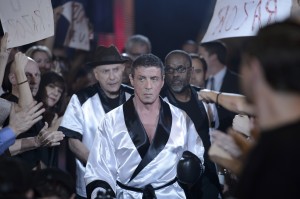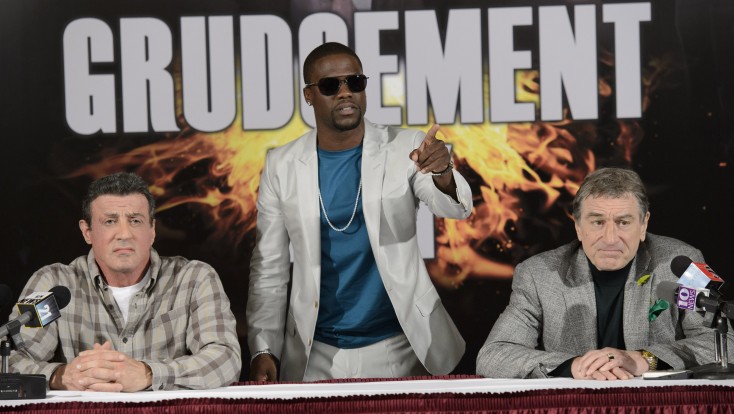
(l-r) Alan Arkin as Louis “Lightning” Conio and Sylvester Stallone as Henry “Razor” Sharp in GRUDGE MATCH. ©Warner Bros. Entertainment. CR: Ben Rothstein.
By ANGELA DAWSON
Front Row Features
NEW YORK—Billed as “a rivalry 30 years in the making,” “Grudge Match” pits Sylvester Stallone (“Rocky”) against Robert De Niro (“Raging Bull”).
These two film boxing legends and Oscar winners aren’t reprising their iconic characters but rather they play longtime rivals, who agree to get back in the ring one last time to settle an old score. Their animosity is so intense, the question is can they avoid killing each other before they have their rematch.
Directed by Peter Segal (“Anger Management,” “50 First Dates”), this dramedy features an all-star cast including Oscar winners Alan Arkin and Kim Basinger as well as funnyman Kevin Hart, who plays a boxing promoter.
Stallone plays Henry “Razor” Sharp, who inexplicably retired from boxing before his third bout with rival Billy “The Kid” McDonnen, effectively ending both their careers. Three decades later, a boxing promoter (Hart) offers them an opportunity to settle their score—and earn a big payday—in the ring.
The 67-year-old actor/filmmaker recently explained why he wanted to do another boxing movie, going mano-a-mano with De Niro in the ring and the appeal of playing a boxer that was not his own creation.
Q: Where did the idea of you and Robert De Niro appearing together in a boxing movie come from? Did you talk about it when you did “Copland” together?
Stallone: Actually, I had no intention of doing this. I have no credibility in suggesting that this came from us. It was something I thought was absurd. I said, “No one wants to see another boxing film, especially when you’re approaching 160 years old.” I thought I might be a little rickety, bones coming out. But then Robert (De Niro) called me and we talked a lot about it with the studio heads, and they convinced me that I was complete wrong. (He laughs.)
Q: This film has a lot to say about aging. What are your thoughts on getting older and how did you train for this film?
Stallone: I’ve always enjoyed working out but this thing was pretty extraordinary because it proves that you don’t have to be crawling around at a certain age or that you’re obliged to start winding down. You’re going against trend. As long as you still have something to prove—a lot of people when they reach 60 and above, they say, “I have some unfinished business”—but unfortunately, life doesn’t afford you the fact to go back and right the wrongs. This is the beauty of fantasy and imagination. To have these guys go and correct a moment in their lives that will make their life feel somewhat fulfilled is great. That’s the fantasy, and that’s where the empathy comes in with the audience.
Q: Why do you think boxing movies connect with audiences?
Stallone: “Rocky” and “Raging Bull” aren’t really about boxing. They’re biographies and these guys happen to be fighters. Everyone knows what it’s like to be frustrated and want to fight back on any emotional level. That’s what we pulled from. I just happen to have an affinity for it. So does Bobby (De Niro). So do a lot of people. That’s probably why there have been more boxing films done than any other kind of (sports) film. What made this thing fly was the inspired casting. Kevin Hart brings in a whole new demographic. It’s one thing to see grumpy old men fighting, but then you bring in Kevin Hart, and I thought “Wow!” And, of course, Kim Basinger brings a whole sensuality to it. So I thought it was really really clever.
Q: What do you think of co-star Alan Arkin?
Stallone: You know what I hate about Alan? He can just yawn and it’s funny.
Q: If you could trade your Academy Awards for a legitimate championship in boxing, would you do it?
Stallone: Having been in the ring with a couple of actual professionals, I’m certain I made the right choice. It’s great to be able to interpret it and try to get the feelings of it, for example. Whenever you meet Mike Tyson, or any one of these fellas, there’s so much drama going on and to be able to play it and then get rid of it (after you finish shooting) and not have to live with it, because it’s a very hectic, traumatic life these guys live, so I (like being an actor). I did say to Bobby, “Once you’re in the ring, those Oscars aren’t going to help you.” (He laughs.) Your career as a boxer is so short-lived, usually.
Q: What did you most enjoy about your role?
Stallone: I guess the villainous character, the edgier character is (De Niro’s). I’m the more forlorn character; the coward that worked in the steel mill and just sort of gave up.
Q: Did you and Mr. De Niro train together? Was there any rivalry in the training sessions?
Stallone: I couldn’t wait to fight him. I’ve been dying to fight him. With “Raging Bull,” he crossed the line. (He chuckles.) This was extraordinary. This is like if you were casting the lead in The Nutcracker or Swan Lake, and you don’t get to see your lead dancer until the curtain goes up. He had to work on the East Coast; I had to work on the West Coast. We couldn’t get together. So by the time we got in the ring together, I was thinking, “I hope we look good,” because we didn’t know. Usually with the “Rocky” films, it’s five or six months preparation with the (opponent). We didn’t have that opportunity. That’s why this is pretty extraordinary. I have to give Bobby a little credit for his professionalism.
Q: How does it feel to be in a film where you’re boxing but you’re not directing it?
Stallone: The budget was a little tight on this. I remember with “Rocky 2,” they’d build gyms for you. When we choreographed this in the hall of a Jewish Community Center in Beverly Hills, we used a clothesline with four broomsticks on an old carpet in a freezing building. I had torn a bunch of tendons in my leg, so I was wearing a cast from my hip down to the boot. I’m limping around. It looks like a pirate learning how to fight. I wondered, “Is this ever going to work?” I said to Peter (Segal, the director), “Trust me, this is how it begins. You don’t need a big arena. You don’t need anything.” So I thought Bobby’s style and my style-that’s what it’s about. He should be more like his “Raging Bull” type and I have to be more of a boxer. Basically, in our fight characters, we’re both sluggers. I thought, “That wouldn’t look too interesting.” So I had to be in the reverse all the time. I’m moving backwards. He’s the aggressor. So these are the things you work out. I think (Segal) showed us some documentary footage. So every day it just got a little bit better and before you knew it, we were ready to go. You don’t have to start out in the penthouse. You can start out in the boiler room and get there. And this started out as meager as it could be. Also, with the fight aspect of it, everyone has his strong suit. Bobby has a certain way he throws his arms, his combination, so you cater to that. You move to the left, and then you move the right. So there’s a little thought that goes into it. The question that’s most important here is: it’s (Segal’s) movie. It’s not my movie. You have to be sensitive to that. It’s not my boxing film. Mine has like nine cameras involved. Peter’s telling a personal story with the backdrop of a fight. So I completely deferred to the dramatic aspect of what he’s trying to say rather than (me and De Niro) beating the hell out of each other. It was all story points. So it’s definitely his vision.
Q: If someone had asked you whether you would be making a boxing picture at 67 when you made “Rocky,” how would you have answered?
Stallone: I would have punched him. I would have said, “Are you crazy?” (He laughs.) When I started out, I thought (it would be) “Rocky” and that’s it. I didn’t know there would be “Rocky 90.” It’s one of those things that just kept going. So, no.
Q: You were inducted into the Boxing Hall of Fame. What does that mean to you?
Stallone: First of all, I was a little embarrassed because I’m actually not a fighter. They look (at the induction) as someone who helps promote boxing. So there I was with Mike Tyson and Julio Cesar Chavez Jr. It was just another validation that you’re helping promote the sport. I’ve always loved the sport. There’s something about it. When I was seven or eight, I was just fascinated by this idea of two men showing their hearts and going for it.
Q: Did you do any amateur boxing?
Stallone: Yeah. A little bit. And not well.
Q: What did you think of “Raging Bull?”
Stallone: I never saw it. Was it any good? At first, I thought “Raging Bull” was about homesteading and ranching. (He laughs.) Of course, it was one of the greatest biographies of all time. It’s timeless. What can I say? And Bobby gave a perfect perfect performance.





